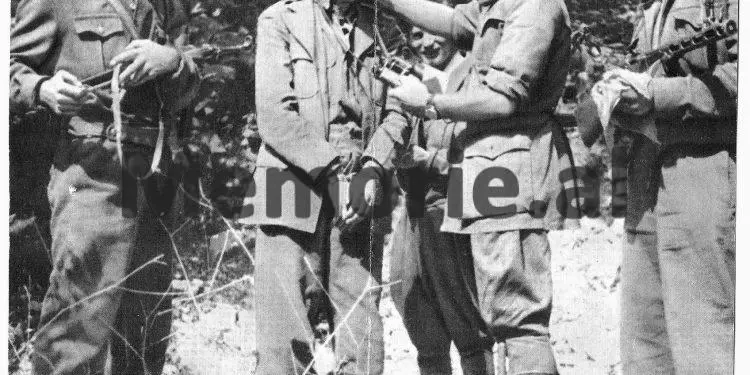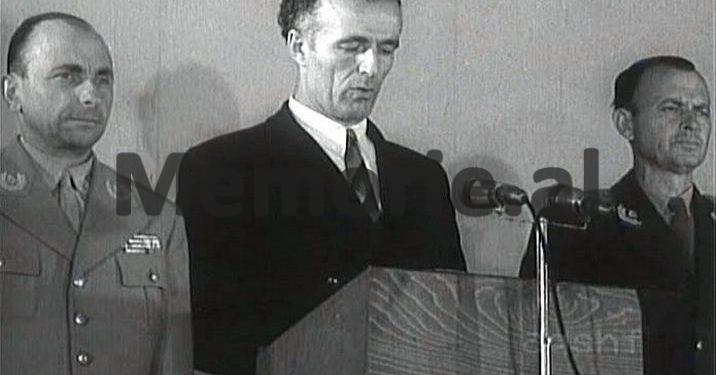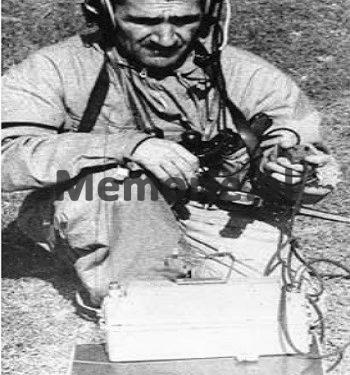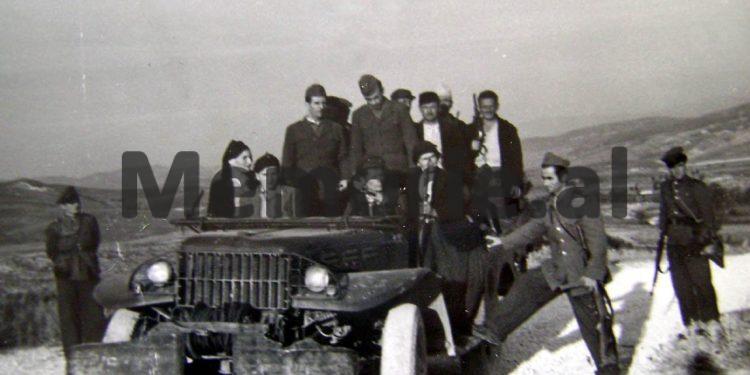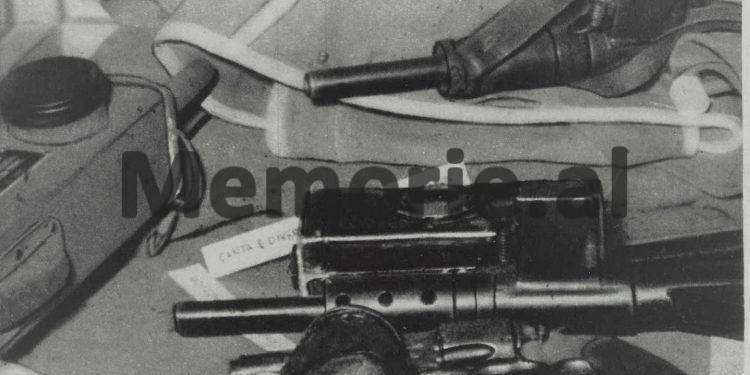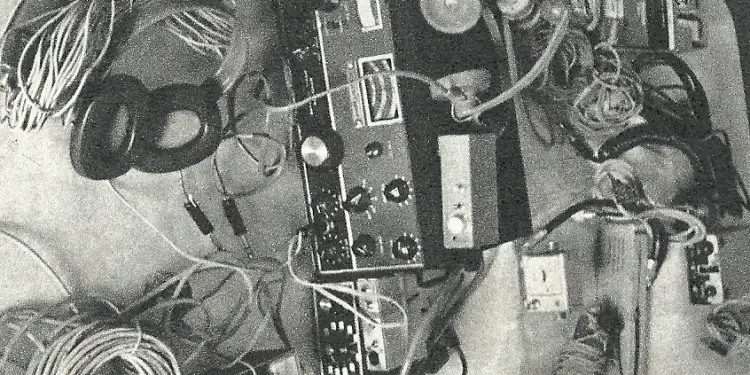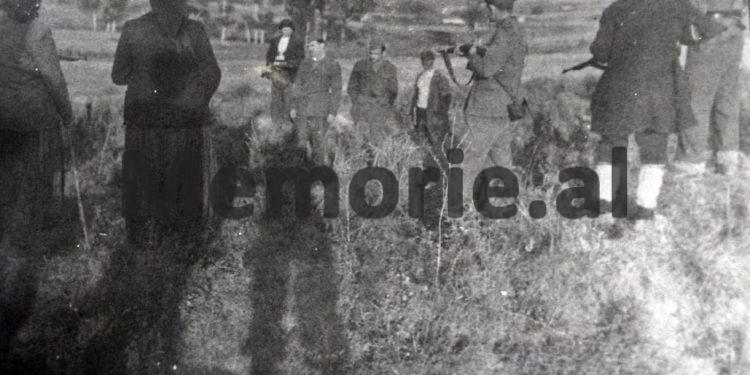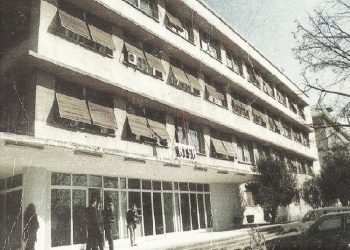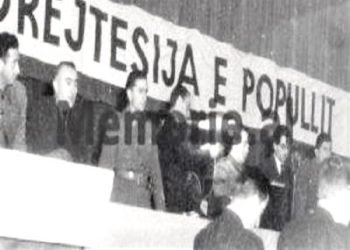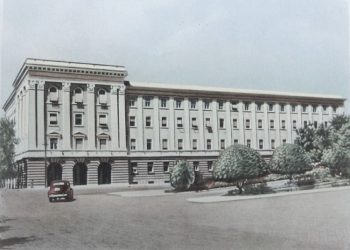By Enver MEMISHAJ
-The three paratroopers were put in the service of the Security, while Et’hem Zyber Likaj from Lepenica, refused to surrender, but fought until he was killed-
Memorie.al / Tefik Zyber Likaj was a poor peasant from Lepenica in Vlora, as the communists themselves claim in their report dated April 2, 1945, he was devoid of any wealth, but he had a great patriotic heart. He was the only son of Zyber Likaj. A part of this tribe later kept the surname Myslymaj. His father, for many reasons, was unable to do something for the memory of his only son. The people close to him who had the opportunity not to let the name of this brave boy be lost, did nothing for him, once out of fear, but even today in freedom, no one remembered him. In order for the beautiful name of Tefik Likaj not to be erased from memory, that is, not to die, as the outstanding world-famous writer Isabel Allende says, but to be remembered by his relatives, his brave villagers and by all those who love him this country, I am remembering with this article, this brave boy, with a big heart, who fought for freedom and died for Albania, at the age of 25.
- The landing parties.
For about three years, from 1949 to 1952, Albania was in the center of attention of the Anglo-American secret services, as well as of the neighbors. Agents and groups of scouts landed in Albania by land, air and sea. Their aim was to make possible the overthrow of the communist regime. But almost all these efforts of foreign agencies in cooperation with the Albanian political emigration that wanted the fall of the communist regime, failed. This is thanks to the dictatorship and terror established in Albania, the game of the Albanian secret services, which managed to neutralize almost all the subversive groups that exist in Albania during this period. The role of the famous English agent, Kim Filbi, in the failure and elimination of diversionist groups in Albania is still debatable. The first landing in Albania was made in February 1949 in the mountains of Mirdita.
The second landing with a group of four people and some parachutes with materials for them, landed by parachute from the air, launched by the Italian reconnaissance, at about 22:30 on July 8, 1949, in the place called “Arat e Verdha, between Progonat and Golem streets of Tepelena. On the morning of July 9, the paratroopers, after hiding the materials, took with them food and a portable radio transmitter and set off for Progonat mountain. In search of water to drink, they met on the road a young man with animals, loaded with water, going to his stable. They told the boy that they were soldiers of the State Security Brigade and asked him for water, but Myrto Kurra, the boy’s father, who was an employee of the State Security, recognized one of the paratroopers, his fellow villager, Et’hem Çakon. Myrto Kurra, despite all the promises that he would not spy on them, when the paratroopers left; he started the boy at the Police Station, which was 3 hours away.
Upon receiving the notification, the Department of Internal Affairs Tepelena, Gjirokastër and Vlora, under the command of an experienced officer of the Ministry of the Interior, who arrived in Tepelena on July 9, combined actions to capture or destroy the paratroopers. On July 10, 1949, around 11:30 p.m., while the group of paratroopers was returning to drink water at a spring near Progonat, they encountered the Security forces. After a brief effort, the paratroopers were able to break through the encirclement and left, but not in groups. They dispersed, leaving behind a machine gun, topographical maps, jackets and other loot. The next day, July 11, one of the paratroopers appeared at the stable of a shepherd from Progonati, who after promising to hide and protect him ran and spied on the Security forces, which surrounded him and called him to surrender as there was no escape.
He responded with a gun, but after a short resistance he surrendered without resistance and declared that he was Kasem Zhupa from the village of Kopacez in the district of Saranda. At daybreak on July 12, the police forces and the villagers of Kuci of Vlora, surrounded and called for the surrender of the other two paratroopers, who surrendered without using weapons. They declared that they were: Et`hem Çako from Progonati and Llukman Muftiu, an Albanian from Macedonia. The fourth landing party, who was separated from the group in the attempt that was made on July 10, 1949, on the way, had the opportunity to hide in his village, in Lepenica in the district of Vlora, or with a friend of his he asked a shepherd from Kuçi for help, who agreed to help him and hid him, but after the word given, this State Security spy ran and spied on him.
On July 12, 1949, the fourth landing party was surrounded by numerous security, defense, police and public forces and was asked to surrender, telling him that his comrades had surrendered and making many promises. . He responded to the promises of the communists with weapons. He refused to surrender to their hands and for this he stayed and fought for over two hours, when he ran out of bullets, in an attempt to break the siege he was barbarically killed. This was the brave and patriot, Tefik Likaj from Lepenica of Vlora. At the end of May 1950, before the trial, Et’hem Çakua testified that; “From one o’clock in the middle of the night on July 10, we fell into an effort in a stream near Progonat, that’s where Tefik Likaj got separated from us, whom we didn’t see again, and the same thing happened with Kasëm Zhupa”.
Thus, the forces of the State Security, because of the disloyalty of the villagers, unlike the Albanian tradition and customs, that the friend does not surrender, as well as the spying of his collaborators, after three and a half days, they had Albanian blood on their hands, the group that had landed on July 8, 1949, of four people: Et`hem Çako, group leader and commander. He was born in 1905, in Progonat in Tepelenas. Former non-commissioned officer of the gendarmerie and financial guard. In 1942, I joined the organization of the National Front and held leadership positions in Delvina. He escaped with the Germans to Germany and later to Italy.
Llukman Muftiu, deputy in charge and deputy accountant. He was born in the town of Dobrush, Macedonia with Albanian nationality. To escape the Serbian oppression, he escaped from Macedonia in 1946. Kasem Zhupa, radio operator of the group. He was born in 1923, in Kopacez town of Saranda. During the war, he had served in the ranks of the militia, until the capitulation of Italy, and then served in the ranks of the National Front. Escaped in 1944. In 1945, completed an espionage course in Graz, Austria, and then went to Italy, where he joined the National Front. Tefik Likaj, assistant radio operator and material manager. He was born in Lepenica in Vlora in 1924. Like his entire village, he was one of the prominent soldiers and activists of the National Front, as well as a member of the guerrilla units of the National Front in the city of Vlora. He escaped at the end of 1944, to Italy.
- Who was Tefik Likaj?
Tefik Likaj was a boy with little education, but with a big patriotic heart and high natural intelligence. This made him one of the first activists and fighters against Italian fascism at the beginning of the Anti-Fascist Movement. He fought bravely in the Battle of George, December 31, 1942, until January 2, 1943, against Italian fascism. As soon as the disputes between the Communist Party and the National Front began, Tefik Likaj, with the ingenuity that characterized him, became one of the determined soldiers of the National Front. He participated in all the anti-fascist battles that the forces of the National Front of Vlora have carried out.
The commander of Balli, Hysni Lepenica, with the shrewdness that characterized him, recognized in Tefik Likaj the qualities of a brave warrior and loyal patriot and therefore took him with him and kept him close to him as his sleepless guard. Tefik Likaj, justified the commander’s loyalty, not only during the War, but also in the last moments of his life, he refused to surrender alive to the communists.
Xhemil Beharaj, speaking about Vakthi Shemen (1950-1990), from Fieri, the composer of the well-known song “Bardhësi”, tells about an interesting case. Vakthiu inherited his talent from his father, Tefik Sheme, who when he played the violin, the whistles landed on his shoulders. Tefiku had learned the violin from Bilbil Vlora, known at that time as a violinist. Further, Xhemil Beharaj continues: “During the war, 1939-1944, the bey of the Roskovec area, Isa Toska, had captured Tefik Lepenica and was going to hang him. It was April or May, say the children of Vakthi, Erjoni and Iliri, as they have the story told by their grandfather, Tefik Sheme. He said that he was returning from a lunch, where he had been invited. When he found out about the slave Tefik Lepenica, he stopped and addressed Isa Toska with the words:
– What are you doing, Isa? Let him sin.
Bey replied:
– Tefik aga, I forgive you if you play the violin and put the whistles on your shoulders.
Isa Bey thought that this would not happen.
Tefiku immediately launched into an oily melody, playing very sweetly on the violin. A nightingale that was nearby in a tree goes and sits on Tefik’s shoulder.
Isa Toska was surprised and released Tefik Lepenica, but says:
– Don’t think that if I took you back, I won’t hang you. Escape. Today you have life from Tefik Sheme”.
So this 19-year-old boy did not leave the legendary Commander Hysni Lepenica for a single day and fought bravely for the freedom of his country. At the end of 1944, Tefik Likaj, together with many fighters of the National Front of Vlora, emigrated abroad, with pain that he had left his homeland under the communist dictatorship.
- Expropriation of Tefik Likaj
The communist government, the first measure it took was the imprisonment and expropriation of the “enemies of the people”, i.e. its political opponents. Tefik Likaj was also considered such. For the interests of the reader, we are giving the full decision of the sequestration of the property of Tefik Zyber Likaj:
Decision No. 59 dated 22.6.1945
“On the sequestration of the property of political war criminal fugitive Tefik Zyberi from Lepenicë village of Kota sub-prefecture”. The Executive Committee of the sub-prefecture of Kota, take into account that from the reliable information that this Committee has, as well as from the investigations that have been carried out by the Commission, on the detection of crimes and war criminals in this district, named Tefik Zyberi from the resident in Lepenic village, is on the run abroad or inside the country for political reasons. Take into account articles 1 and 2 of the law dated December 15, 1944, on the confiscation of private property of political fugitives;
Order
The seizure of the property of the above-mentioned Tefik Zyberi, wherever it is and in whoever’s hands, were obliged to deliver it to this Committee. The property is described in the report attached to this decision.
Drashovice, on 22.6.1945
Executive Committee of the Subprefecture of Kota.
REPORT
“Tefik Zyberi from Lepenicë village.
Escaped with the occupier on October 15, 1944. His residence in Vlora. His political activity: Gendarme of the quislinga government. Marital Status: He is stripped of all. Drashovice, on 2.4.1945. Commission for Registration and Administration of Assets of Political Fugitives of Kota Subprefecture.
- Tefik Likaj in emigration.
Tefik Likaj was initially in the camp of Reggio Emilia, Italy in the company of Sami Ngucaj and under the care of his older villagers, Nebi and Hysen Lepenica. This brave and intelligent boy had caught the eye of Mid’hat Frashër, who kept him close to him with love. This can also be seen from a photograph that Tefik Likaj took with the leader of the National Front, Midhat Frashëri. He was sworn to the fight against communism and sworn not to fall alive into their hands, which he proved by giving his life with a gun in hand at the young age of 25. Based on this conviction and decision, he agreed to parachute into Albania to obtain information and to set up bases for agitation and propaganda against the communist dictatorial system.
At the behest of Mid`hat Frashëri, Qenan Hyska, one of the commanders of the National Front of Vlora, convinced Tefik to fly to Albania. In the same way, Et’hem Çakua, Llukman Myftiu and Kasem Zhupa agreed to jump to Albania, based on the hatred they had for the communist dictatorial system, and they connected with the Italian Discovery, through De Agostini, an experienced member of this Discovery. The four mentioned settled in a villa named “Linda”, in a hidden place, 8 kilometers from the city of Bari. Here they completed a course that began on January 2, 1949 and ended on July 7 of this year.
In the course, they learned about how to recruit the agency in Albania, the use of radio broadcasting, the use of secret code, encryption and decryption, etc.
To fly to Albania, the group was perfectly equipped. Only with the materials that the group had taken with it, it was possible to live and act without asking for anything, for 6 months, while it could maintain communication via radio for more than two years. For transmission and information, the group was equipped with secret codes, e.g. “Thank you Philip”, he would say: “We are in good health, the radios are not working”, etc. Likewise, each member of the group was identified by nicknames: Et’hem Çakua = “Fiore Guizeppe”, Kasëm Zhupa = “Moscow”, Llukman Muftiu = “Fusko”, Tefik Likaj = “Bomb”. All four landings were equipped with fake notification letters. Tefik Likaj, had a notification letter with the name Hysen Ademaj. Each of them carried a topographical map, compass, and flashlight. Civilian clothes and military clothes, 50 napoleons of gold and food for 6 months. Their armament: a German machine gun with 4 magazines and 240 rounds, an Italian revolver with 14 rounds and 4 American grenades. All these materials fell into the hands of the State Security.
- Radio show “Buza e Drhit”
The three paratroopers who surrendered to the State Security: Et`hem Çako, Llukman Myftiu and Kasem Zhupa, based on the captured documents and materials, told everything about the purpose of coming to Albania and to save their lives, agreed to cooperate with the State Security. The senior leaders of the State Security Organs, Kadri Hazbiu with the nickname “Besniku” and Mehmet Shehu, took advantage of this opportunity and organized the radio game; “Buza e Bredhi”, in order to learn about the activity of the Italian Discovery, penetrate the Albanian political emigration and capture other fugitives, as well as benefit from materials, for which they were very poor.
The radio game “Buza e Bredhi” is the first game undertaken by the State Security bodies. It took place from July 15, 1949, to November 1, 1949.
Italian intelligence fell into this trap and did not believe that “Fiore Guizeppe”, alias Et’hem Çako, had been captured alive by the Albanian State Security. To prove this, they sent a group of 14 Albanians, led by Izet Vrazhdo, to Albania through the Greek Discovery. From this group, 7 people barely escaped alive, including Izet Vrazhdo, who went to Greece. Seven others were killed or surrendered. But also Izet Vrazhdo, as a result of the radio game, was put in prison by the Greek Discovery. Thanks to the radio game, not only the Italian Discovery, but also the Greek Discovery, began to distrust the landing forces they had sent to Albania. The condition of “Fiore Guizeppes” remained dark for Italian espionage and the radio play continued successfully, even for some time. They sent ammunition, food, medicine, and clothing to “Fiore”, who they remembered as being free in the mountains of Albania.
For the organization of this trap, it was necessary to avoid the public exposure made by the Head of the Department of Internal Affairs of Vlora, who, when Et`hem Çakua and Llukman Myftiu were caught, brought them out in front of the people, to do according to the inhuman communist custom, their public unmasking. In order to convince the people that the paratroopers had not been captured, it was published that those who had been unmasked in front of the people were not saboteurs, but travelers who were going about their business and had been mistakenly arrested and to convince the people, or rather to lie to them that, the Security organized a large-scale pursuit with the masses of the people, to catch the “saboteurs”! These actions led the people to believe that Et’hem Çakua and his friends were not captured, but were operating freely in the mountains. In the first days of September 1949, the Izet Vrazhdos group, which consisted of 14 people and was divided into four groups, entered from Greece, in the region of Kurveles and the Vlora River, among others, in order to receive information about the group of Et’hem Chako?
A few days after the group had entered Albania, the agent of the State Security, “Manushaqia”, from Gjirokastra, came into contact with the paratrooper Manxhar Hoxha from the Kolonje district of Gjirokastra, a member of Izet Vrazhdo’s group. The “Manushaqia” agent, according to the orders he had received from the Security officers, told Manjhar Hoxha that: “Et’hem Çako’s cap was not true, but the Security, to make Et’hem not be trusted and not to be helped by the people, he said that he was caught. The one who was unmasked in front of the people was not Et’hemi and his friends, but two soldiers dressed as saboteurs. You had said these things to a tribe of Et’hem in Tepelena”.
After this meeting, “Manushaqia” reported to his bosses and added that Manxhari had trusted him and had rewarded him with a gold napoleon, which the Security officers took from him! “Manushaqia”, he told his bosses, that as soon as I finished the conversation with Manxhar Hoxha, he wrote something on a letter gave it to another person and told him to pass it on. In this way, the Security was convinced that Manjhar Hoxha had reported to the center that; Et`hem Chakua was not captured. This was the first success of Sigurimi. The “Manushaqia” agent tricked Manjhar Hoxha’s group of four into a trap. They refused to surrender and after armed attempts, Manjhari and two of his companions were killed, the fourth surrendered.
From the depositions of this landing, Sigurimi received detailed information, especially the notification that was made to him; Et`hem Çakua was healthy and in action, so Sigurimi could continue his game. As a result of information provided by Sigurimi spies, it was possible to kill three more members of Izet Vrazhdo’s group. In these circumstances, Izeti was forced to return to Greece, with 7 people who escaped alive.
After Izet returned to Greece, the State Security ordered Et’hem Çakon, now their agent, to convey to the Italian Discovery that the group of Izet Vrazhdos had arrived in Albania, for 14 years, that Izet had met with officers of Albanian Security, in Qishbardha of Vlora and as a result, 7 people of his group were killed, and that Izeti, performed a double role. The State Security had achieved its diabolical goal, Izeti upon arriving in Greece was imprisoned and there was a lot of confusion about his fate. After these actions, the State Security intended to arrest Et’hem Çako, in connection with the Italian Legation in Tirana. In order to achieve this goal, Sigurimi should organize the meeting of Et`hem Çako, with his mother in Progonat, to whom Et`hemi told that he was free and operating in the mountains and had also given her a gold napoleon, yes this is how his meeting with his wife in Durrës was organized.
These meetings were carried out because the Italian Intelligence, with agents sent to Albania, could meet the mother or the wife of Et’hem Çako, to get information about his activities. After these meetings, to believe in the game organized by the State Security, on the evening of September 2, 1949, it allegedly organized an armed attempt with a group of saboteurs in Bênç i Tepelena.
At the end of the “effort”, the Security forces marched triumphantly, in a demonstrative way, through the middle of the village, carrying on a mule “a human body”, of a killed saboteur, which they buried near this village, near the Post Office of the Police, in order for the grave not to be opened by anyone. The security parrots popularized the “attempt” and “killing” of the saboteur, prophecies which the people believed.
To confirm the success of the attempt of September 2, Sigurimi, on September 6, 1949, published in the newspaper “Zeri i Populli” and “Bashkimi”, the communiqué of the Ministry of Internal Affairs:
“On the evening of September 2, 1952, between the Bênç and Lekdush neighborhoods of the Tepelena district, the State Security bodies in cooperation with the People’s Defense Forces killed the enemy of the people and the spy of imperialism, Tefik Likaj (Zyberaj) from Lepenicë village of Vlora. The mentioned, since the creation of the Bashibozuk forces of the National Front, has taken an active part with weapons in hand, against the National Liberation War, being a loyal guard of the branded criminal, Hysni Lepenica, later a member of the guerrilla units of the National Front for the city of Vlora…”!
Below, the communiqué continues with the communist language of unscrupulous slanders, insults and the number of uncountable crimes that this 20-year-old boy had committed in 1944… And that he had ended up in the lap of Italian imperialism, against the country of his…!
Everything that was said in this communique about Tefik Likaj was a lie and hypocrisy, characteristic of communists. He was a brave soldier of the National Front, watchful eye of his Commander Hysni Lepenica. Tefik Likaj, could not be accused of any crime and was killed on July 12, 1949, fighting bravely, not to fall alive into the hands of the communists. The criminal officers had stripped him by taking all his body clothes, left him only in his panties and buried him by pretending to kick him in the grave, in the place where he was killed. His grave was lost forever.
The State Security, in order to continue the “Buza e Bredhi” radio play, also came to the aid of the documents that were captured from the four saboteurs killed in the province of Vlora, in November 1949. In their documents, transmitted to the Italian Discovery, they reported that, they had not had the opportunity to be accurately informed about the fate of Et’hem Çako’s group and promised to work in this direction. The State Security radio game, organized with the contribution of Et`hem Çako, Kasem Zhupa and Llukman Mufti, was interrupted by the betrayal of a Security officer, who had found out about the radio game, a few days before the deadline began for Et’hem Chako’s meeting with agents of the Italian Legation. This officer had gone to Italy on service and had given everything to the Italian Discovery. His information determined the closure of the radio game.
At the end of May 1950, Et’hem Çako, Kasem Zhupa and Llukman Myftiu appeared in an open propaganda trial. The communist jury consisted of: Chairman, Colonel Shuaip Panariti, member, Captain Vangjel Korça, Captain Nonda Papuli.
The three defendants became ridiculous in front of the people, as far as it was understood, that they lied or declared what the State Security asked them to do. In conclusion, the Court decided that Et`hem Çakua, Kasem Zhupa and Llukman Muftiu should be sentenced to death. The execution of the death sentence for all three was to be carried out by firing squad. This decision is final. Tirana on June 6, 1950. The State Security, (because in fact he decided the punishments), spared their lives, but sentenced them to heavy prison terms and they rotted in prison. Only Et’hemi was able to leave and live in Durrës, remaining until the end, an agent of the State Security. Memorie.al




